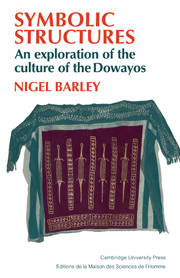Book contents
- Frontmatter
- Contents
- Acknowledgments
- Preface
- 1 The ethnographic background
- 2 Symbolism and the punctuation of culture
- 3 Some problems of the representational model of symbolism
- 4 The leopard cannot change his spots
- 5 Water and fertility
- 6 Tarniisnohgbarklele: ‘the place where the old Fulani woman was beaten to death’
- 7 ‘It is only thanks to me that you were circumcised’
- 8 The seasons of the year and the joker in the pack: relations of nesting and quotation
- Appendix: The festivals
- Notes
- Bibliography
- Index
2 - Symbolism and the punctuation of culture
Published online by Cambridge University Press: 07 May 2010
- Frontmatter
- Contents
- Acknowledgments
- Preface
- 1 The ethnographic background
- 2 Symbolism and the punctuation of culture
- 3 Some problems of the representational model of symbolism
- 4 The leopard cannot change his spots
- 5 Water and fertility
- 6 Tarniisnohgbarklele: ‘the place where the old Fulani woman was beaten to death’
- 7 ‘It is only thanks to me that you were circumcised’
- 8 The seasons of the year and the joker in the pack: relations of nesting and quotation
- Appendix: The festivals
- Notes
- Bibliography
- Index
Summary
The word ‘symbolism’ has come to be used in such a variety of senses that it no longer constitutes a well-defined category. It has been used as an etic category of the observer, an emic category used by the observed, a discrete class of behaviour, and an aspect of all behaviour. The simplest and most pervasive viewpoint in anthropology can be summed up as: ‘This looks crazy. It must be symbolism.’
Such a tendency is to be found in Sperber's (1974: 4) criterion of symbolicity, once it has been stripped of elegant expression. Thus, he writes: ‘I note then as symbolic all activity where the means put into play [sic] seem to me to be clearly disproportionate to the explicit or implicit end, whether this end be knowledge, communication or production – that is to say all activity whose rationale escapes me.’ The tradition is one sanctioned by generations of anthropological practice. The decision to interpret behaviour as ‘symbolic’ is often the product of the failure of the anthropologist to comprehend something, plus a dogmatic commitment to the rationality of primitive man. The result is as uneasy as the literary critic who blandly regards poetry as merely deviant language. The normal becomes thereby firmly cut off from symbolic analysis. As Sperber remarks concerning Dorze food: ‘When a Dorze eats a normally buttered dish, no symbolism need be postulated … In other words, an element takes on its symbolic value to the extent that it departs from a norm’ (1974:61).
Information
- Type
- Chapter
- Information
- Symbolic StructuresAn Exploration of the Culture of the Dowayos, pp. 10 - 20Publisher: Cambridge University PressPrint publication year: 1983
